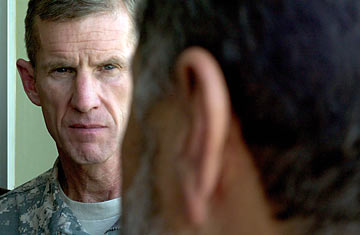
Following the murder of the chief of police and an outbreak of fighting by insurgents in the city's streets, General Stanley McChrystal, newly appointed head of forces in Afghanistan, is briefed by an Afghan National Army commander at a base in Kandahar
(6 of 7)
You have lost at least seven men to IEDs since you arrived. What does this say about the way we fight this war?
What they are doing is multi — for one, they have found a tactic that can create casualties. They found a tactic that they don't have to stand and fight against Afghan and coalition forces. They have found a tactic that can be employed by anyone, any age, any sex, whatever. More importantly, we have to look at what this tells us about their capabilities and intent. We know that IEDs have a tremendous psychological impact on everyone — on the population, on the coalition forces, on the ANSF. We also know they inhibit freedom of movement. So to the degree that they stop you or hinder you from going into an area, they can protect sanctuaries for insurgents. So what we are looking at hard right now is not only how we can combat them but also what are they trying to do with them, what is their real intent. What we found, in Iraq and here, is that at the end of the day, there is no single technological silver bullet. What you have to do is establish rule of law and control, so that placing IEDs is very difficult and not accepted by the populace. And you drive them down that way.
A large part of those IED components come from Pakistan. How vital is your success here to the elimination of safe havens across the border?
It's a regional problem. Our success in Afghanistan and Pakistan — they are unique situations that are linked inextricably — I think that we can't be entirely successful here unless there is some measure of success against Afghan Taliban and other al-Qaeda in Pakistan. Similarly, and I met with General [Ashfaq] Kayani yesterday, I don't think that they can be entirely successful in maintaining security in the tribal areas unless Afghanistan is a stable state, so I think there is a shared mutual interest because they both feed on each other.
Does the Pakistan military have the ability to fight that war? What is your strategy to help them?
I don't think the hammer-and-anvil metaphor works here, because frankly, there is not enough force on either side to be hammer or anvil. I do think that as we both do counterinsurgency, it has a less obvious controlling factor against the people who operate. What we are doing is reducing the relative safe haven on either side. There is a long way to go with this, though. I don't want to give the impression that we are near success on either side. I believe that their resolve to deal with threats like Baitullah Mehsud is absolutely genuine. I think that there is a focus both articulated by their leadership but also by the number of soldiers lost to their commitment on this. I think that both of us will have to stay at it. There will be twists and turns and ups and downs, but on both sides of the border, there is an understanding of what has to be done.
The 60-day review?
I think it is going well. We didn't start from scratch. We are using previous assessments that were done last fall and winter. And so what we are doing is bringing in a lot of smart people and letting them do their business. It allows us to bring talent to focus. It gives me time to take a look and not make any decisions before their time. But I think it is going to validate some things we are doing and will shape our thinking. I don't think we are going to open the 60-day plan at the end and suddenly have a new plan, new structure. But I think it is part of a ... the process is as important as the product. So if you set aside Aug. 15 to wait for the review, well, you might want to buy a book.
What things will it validate?
I think decisions already made, like the civil-military-planning ongoing on the U.S. side to uplift the people, I think that it is going to validate that it is absolutely the right thing to do. I think it is going to validate the idea that we need to focus in on the areas most important to us in the beginning, because we don't have enough forces to go everywhere and do anything. I think it is going to highlight the seriousness of the situation and underpin our priorities and focus.
